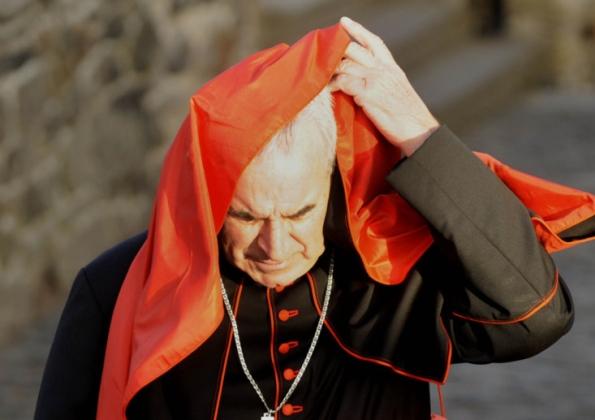Leaders: Cardinal's Apology Fell Short of Confession
The Scotsman
TO THE original shock of allegations of “inappropriate” conduct against Cardinal Keith O’Brien, the head of the Roman Catholic Church in Scotland, came the sudden resignation from office. Now, after a weak denial, comes an apology to the Catholic Church and the people of Scotland and an admission that his sexual conduct had at times “fallen below the standards expected of me”. In the short statement, he also asked for forgiveness from those he had “offended”. First denial, then resignation, now admission: there is no text or form of words that can lighten the blow this admission has delivered, both to the Church and to Cardinal O’Brien personally. The allegations were not of one isolated incident, but a sequence of them, said to involve four priests on separate occasions. Despite this, there will be many inside the Church who will seek to find it in them to understand and to forgive. For contrition, atonement and forgiveness are central tenets of the Christian faith. And a pledge of celibacy is the hardest to maintain, more especially in a liberal age when forms of sexual expression deemed unacceptable until recently have now been embraced as a sign of our respect for diversity and inclusiveness. The response of many will be caught between these conflicting cross-currents of expectations of the highest standards of behaviour on the one hand and understanding of human weakness on the other. This notwithstanding, commitment to celibacy was integral to the life and work of Cardinal O’Brien. And the expectation of faultless conduct intensified with every upward step he took. He was Archbishop of St Andrews and Edinburgh. He was Britain’s most senior Roman Catholic cleric. And he was set, until last week, to be Scotland’s representative at the choosing of a new Pope. Set against this, it may be said that both in length and in content, his short statement late yesterday fell some way short of a fuller confession of misconduct and plea for forgiveness than might have been expected in the circumstances. But whatever form of words he could find, it barely softens the blow for the thousands who looked up to him for inspiration and guidance and for the many more beyond the church who respected his devotion. By far the greater impact of his admission will be on how the Church now reacts to this crisis, now that the Cardinal has put the truth out in the open. As well as representing one of the Church’s darkest hours, the confession is also an opportunity to begin the long process of recovery. One ironic legacy of the events of the past week may be to lend wider support for O’Brien’s recent call for celibacy to be abandoned and for priests to be allowed to marry. Many will feel that this change is long overdue. In the meantime, his successor has a formidable task in rallying the Church and leading it out of the dark night of this episode. Defence numbers do not add up AFTER a long and frustrating delay, the future of RAF Leuchars will be settled, finally, this week. Defence Secretary Philip Hammond is set to announce tomorrow that the RAF, due to move out by 2015, will be replaced with a “significant” army presence at the Fife base. It will receive £60 million of investment from a total of £1.8 billion being ploughed into upgrading bases across the country. While the news for Leuchars should we welcomed, the announcement will do little to settle the controversy over planned reductions to army funding and personnel as defence budget cuts take effect. The government had initially indicated it planned to double the size of the army in Scotland to between 6,500 and 7,000 by 2020. But the Defence Secretary is likely to announce that there will be a “modest increase” of 20 per cent, taking the total to 3,800. That reduction reflects the intense budgetary pressures on the UK government and will be certain to fuel accusations of bad faith and that Scotland has been let down. The military presence in Scotland has been subject to heavy reductions that will be widely felt and the fate of other bases remains to be clarified. However, given the enormity of the budgetary black hole, the original proposal looked unrealistic in this context and hard decisions have had to be taken. A 20 per cent increase in numbers is a considerable advance. But there are wider issues here on the UK’s continuing military commitments and sharp reductions in defence spending. Meanwhile, the sharp variation in numbers begs searching questions on the government’s sure-footedness and decision-making.
|
.
Any original material on these pages is copyright © BishopAccountability.org 2004. Reproduce freely with attribution.
